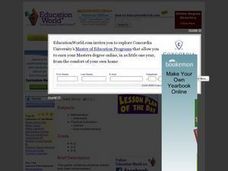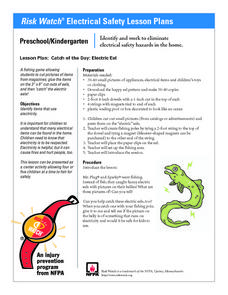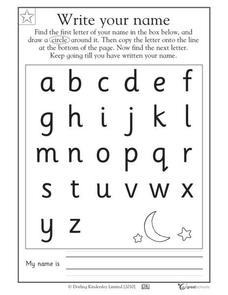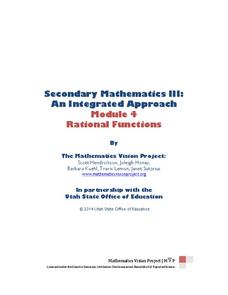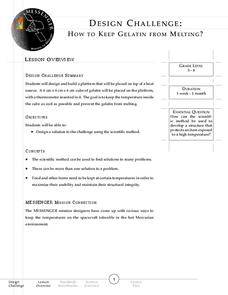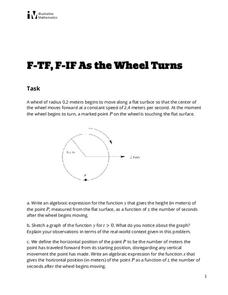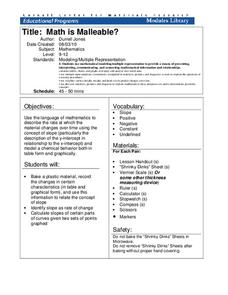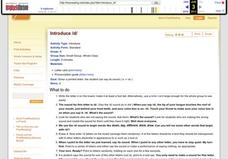Curated OER
Balloon Math: A Game for All Levels
Here is a game that combines exercise with math skills. In this mathematics and P.E. lesson, students hold balloons that have a number written on them, and for a set time do not let the balloons hit the ground. They must catch a balloon...
PBS
Cardboard History
A PBS clip focused on collecting sports memorabilia launches this research project lesson. Class members then read Dan Gutman’s Honus and Me in which Wagner’s baseball card is used to time travel. The lesson ends with researchers...
Curated OER
Georgia O'Keefe - A Unit for Grades 9-12
SStudents view examples of O'Keef's work and watch a video about her life. They use colored pencil to create a 6" x 6" reproduction of a 2" x 2" square cut from a magazine picture, finding and using the most interesting shapes in the...
Curated OER
Catch of the Day: Electric Eel
Students identify and work to eliminate electrical safety hazards in the home. They identify items that use electricity. Students use a fishing game that allows students to cut pictures of items from magazine; glue the items on the 3" x...
Curated OER
Multiplication
In this multiplication learning exercise, students finish filling in a multiplication times table and problem solve thirty-five multiplication equations for mastery.
Curated OER
Asian Art
Art from early China, Korea, and Japan is historically significant. Present these stunning images to your class, while you explain art movements that define traditional Chinese, Korean, and Japanese time periods and culture. Note: This...
Curated OER
Indian Art
Indian art and architecture is covered from the baths of Mohenjo-daro to the Great Stupa in Sanchi. This presentation shows Indian art as it progressed throughout time but focuses heavily on Buddhist art and architecture that originated...
Curated OER
Write Your Name
Kids love to write their own name. Here is a twist on the old trace and write your name three times task. Little ones hunt through the provided alphabet and circle the letters in their name. Then they write the letters on the line below....
DK Publishing
Using the 5 Times Tables, Part 2
Practice the five times table with frogs! After a lesson on multiplying by five, have your third graders draw a line between a group of frogs and the product of the multiplication problem. The numbers go up to 50, which helps learners...
Curated OER
Reintroduce /t/
Use these strategies to connect letter pronunciation, sound, word examples, and recognition, focusing on the letter t. Emerging readers examine the letter and listen to you say the /t/ sound. As you explain how to do it, they try...
Curated OER
Hiroshima: The Cloze Procedure
What is a cloze passage? The first page of this resource details this procedure and its benefits. To determine if Hiroshima is an appropriate reading-level text for your class, have them read the first passage provided, and then give...
Exploratorium
Far Out Corners
Construct a three-dimensional optical illusion when your class is exploring vision and how the eye and brain work together. Three concave corners are mounted inside of a black box, but as a light is shined upon them, they appear to be...
Charleston School District
Solving Systems Graphically
When guess and check gets old, it's time to start graphing! An instructive lesson explains how to solve a system of linear equations using graphing. Equations are in both slope-intercepts and standard form.
EngageNY
Solving Exponential Equations
Use the resource to teach methods for solving exponential equations. Scholars solve exponential equations using logarithms in the twenty-fifth installment of a 35-part module. Equations of the form ab^(ct) = d and f(x) = g(x) are...
Mathematics Vision Project
Module 4: Rational Functions
Time to study the most sensible function — rational functions! The seven-lesson unit develops the concept of a rational function through a connection to rational numbers and fractions. Scholars graph functions, solve equations, and...
NOAA
Deep-Sea Ecosystems – Life is Weird!
A pool of brine in the deep sea can be up to four times as salty as the surrounding sea water. The deep sea ecosystem relies on chemosynthesis and the organisms that live there are often strange to us. The lesson focuses on researching...
Messenger Education
Design Challenge: How to Keep Gelatin from Melting
The inside of the spacecraft Messenger, which explores Mercury, will experience temperatures from 32 to 91 degrees Fahrenheit. In the final installment of a series of four space-related activities, groups spend time discussing and...
Illustrative Mathematics
As the Wheel Turns
Determine the location of a point on a moving wheel. The task challenges groups to determine the horizontal and vertical locations of a point on the edge of wheel that is moving. Teams first determine a function that will model the...
Cornell University
Math Is Malleable?
Learn about polymers while playing with shrinky dinks. Young scholars create a shrinky dink design, bake it, and then record the area, volume, and thickness over time. They model the data using a graph and highlight the key features of...
Prestwick House
Vocabulary in Context: Inside the World of Wizards
Enter the world of Harry Potter and learn new vocabulary at the same time. A high-interest reading passage provides insight into the history of Harry Potter. Follow-up activities incorporate key vocabulary strategies, such as using...
Missouri Department of Elementary
Diversity Day
Party time! Here's a resource that suggests celebrating diversity by organizing a school-wide event that features performers and speakers that represent the various cultures and traditions. The packet includes a list of suggested...
Curated OER
Origin of the Modern Summer Games
Where did the Olympic Summer Games originate? The class takes a look at ancient origins of modern Olympic games. They research the Olympics and write a compare and contrast essay that describes how the Olympic Games have changed since...
DK Publishing
Using the 2 Times Tables, Part 2
Put on a happy face! Third graders master the two times table with the help of a worksheet that prompts them to match groups of happy faces with corresponding numbers. The catch? Each happy face represents two faces! A great way to...
Curated OER
Introduce /d/
Give youngsters a better grasp of the letter d by combining letter sounds, pronunciation, recognition, and word examples. Scholars examine the letter shape then listen to you make the /d/ sound and try it on their own. Kids brainstorm...


